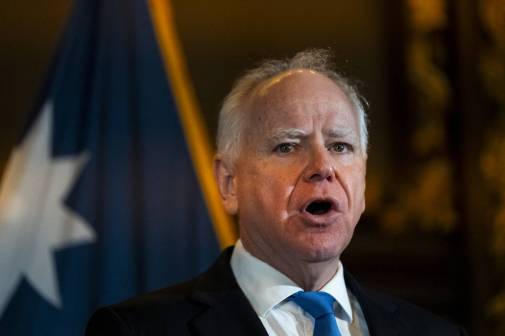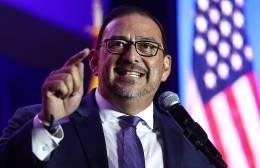Meet the guy paying for West Virginia to run an election on blockchain

Bradley Tusk is best known as the former political operative who invented lobbying for the sharing economy. He’s the guy who claims credit for turning hordes of Uber customers into city-hall picketers whenever the ride-hailing company objected to new taxi regulations in New York, Washington, or a half-dozen other cities. When states tried to crack down on fantasy sports websites that offer daily cash prizes, one of the biggest, Fanduel, hired Tusk to mobilize its user base to hit back at attorneys general. When a local government suggests that the the people who pick up home-improvement jobs through Handy should be classified as employees entitled to benefits, the app calls in Tusk to argue that those workers are independent contractors.
Lobbying for — and investing in — these companies has been lucrative for Tusk, who earned a reported $100 million in Uber stock he received as payment for his work on behalf of the company. Along the way, he’s also set up a venture-capital fund with a portfolio full of healthcare and financial-tech startups, a casino-management firm, and a philanthropic arm.
Now, Tusk — who spent his political years working for the likes of Democratic New York Sen. Chuck Schumer, former Illinois Gov. Rod Blagojevich, and former New York Mayor Mike Bloomberg —wants to spend some of that money on next month’s primary election in West Virginia. He’s not backing any specific candidate, but he’s paying for the state to offer a small group of voters the ability to cast their ballots over the internet, using software that runs on blockchain, the in-vogue encryption platform in which secured data is stored on a decentralized network. (Its best-known use is cryptocurrency, like bitcoin.)
The online voting will be available only to deployed active-duty military members and their families who list their official residences in one of two counties — likely limiting the sample size to no more than a few dozen voters — but Tusk sees it as the first dose of the cure for what ails the republic.
“This is one of the critical things we can do to save democracy,” Tusk says in an interview.
The meek need not apply
As he sees it, giving people an avenue to vote using a smartphone app is a sure way to boost turnout and change who wields influence in elections. There’s no reliable national figure for turnout in primary elections in midterm years, though those years typically bring out fewer voters than presidential years. Only 36 percent of eligible voters participated in 2014’s general elections, compared to 61 percent in 2016.
Tusk’s found a willing partner for his experiment in Mac Warner, West Virginia’s secretary of state, who’ll oversee the May 8 election in which voters will select their parties’ nominees for a U.S. Senate seat, three U.S. House seats, the 100-seat state house of delegates, and half the state senate. (Warner, a Republican elected in 2016, isn’t on the ballot again until 2020.) Warner has been very enthusiastic so far.
“Our military service personnel fight every day across the globe to protect our way of life,” Warner said last week while announcing the blockchain vote. “They deserve to vote as much as anyone, and we owe it to them to make the process as easy as possible.
On paper, military voters are an ideal demographic for an online-voting experiment. The Pentagon works with states to send mail-in ballots to service members deployed around the world and return them to election officials, but those votes are often among the last to be counted.
Eligible military voters from the two participating counties — Monongalia and Harrison, which have a combined population of about 173,000 — will be invited to use an app by a Boston-based company named Voatz, which will log votes using blockchain.
Tusk says it’ll cost him about $150,000 to cover West Virginia’s contract with Voatz. While he adds he’s not a “blockchain evangelist” like some venture capitalists, his fund does have a stake in the cryptocurrency exchange Coinbase. But he says he doesn’t have any direct investment in Voatz. He did have to shop around for a state to partner with, though.
“Once I reached this conclusion that it was a really important thing to do, we wanted to do a few things,” Tusk says. “One was talking to blockchain companies like Voatz, and then figuring out what election officials out there were bold enough, and Mac Warner was. I think he understands what it’s like to risk your life for our right to vote and not having your vote county.”
Warner spent most of his career as an Army judge advocate officer, and his children are active-duty Army officers. Warner’s son, Scott, was the first person to cast a ballot using Voatz’s system, declaring it, according to his dad’s office, to be “pretty slick.”
‘Completely nuts’
But Tusk’s financial backing and the Warner family’s enthusiasm shouldn’t be taken as proof that elections can be conducted securely over the internet, says Duncan Buell, a computer science professor at the University of South Carolina who focuses on voting systems and election integrity.
“I am strongly opposed to electronic voting, and I think the whole notion of internet voting is completely nuts,” Buell says. “There are a number of issues that come up. The first is authentication. How do you verify who’s at the other end?”
Tusk says Voatz will verify participants through the fingerprint-scanning or facial-recognition technology on its users’ smartphones, though Buell says both those protocols can be hacked. Such instances are rare, but not impossible. But even if the personal authentication on the voter’s end can be perfected, Buell says there are other potential security holes after a vote has been cast.
“The other problem we have is that at least as far as I can see from the Voatz website, this is yet again an instance of faith-based voting,” he says. “We have no more reason to think Voatz got its software right as we do these [paperless ballots], because we can’t see the code. There’s an old adage in computer-science class: To err is human, but to really screw things up it takes a computer.”
Electronic voting, and especially online voting, comes with a host of other problems. For starters, Buell says, it transfers authority from government elections officials to software firms with proprietary code. A vote without a paper trail also makes it difficult to challenge potentially corrupted ballots, or for voters accused of corruption to defend themselves. And a successful hack could potentially influence thousands of ballots in an instant, Buell warns.
Buell, who’s not alone among elections experts who believe voting is best kept on paper, also sees blockchain as more of an unnecessary trend than a long-term option.
“Everyone is doing something with blockchain because it’s fashionable,” he says. “Our own state election director was quoted after the 2012 election as saying she wanted people to vote on their phones. It always sounds like a cool idea because it’ll get young people to turn out, but I’m not aware of anything that says it would actually increase turnout.”
A 2015 report by the Beneson Strategy Group did find that 49 percent of millennials said an online option would make them more likely to vote. But politics is still a bigger motivator than ballot technology. A poll published last month by SurveyMonkey and Cosmopolitan found that 68 percent of people aged 18 to 34 say they plan to vote this November.
But even if going online induces a few more young people to vote, West Virginia’s pilot next month still leaves many security questions. Blockchain proponents like Tusk defend their platform by pointing to its decentralization across an ever-growing number of computers, with information retrievable only through a series of long keys.
“It’s verified in so many different machines at the same time,” he says.
Warner’s confidence is even more blunt. He says he’s not aware of anyone who’s hacked blockchain.
“I think it’s very dangerous to say it’s as close to unhackable as posible,” Buell says in response. “It was Robert Mueller who said there are only two kinds of computers on the internet” — paraphrasing the former FBI director, who’s now investigating Russian interference in the 2016 presidential election — “those that have been hacked and those that have not yet been hacked.”






